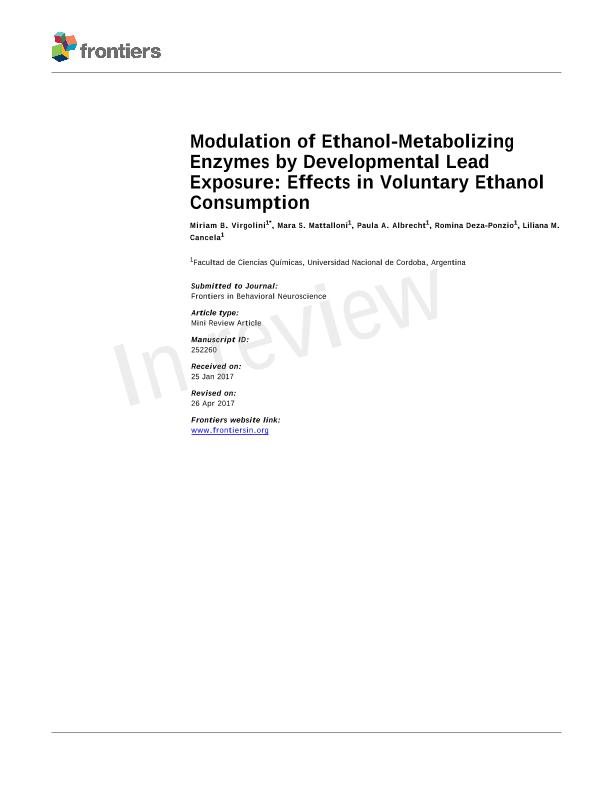Artículo
Modulation of ethanol-metabolizing enzymes by developmental lead exposure: Effects in voluntary ethanol consumption
Virgolini, Miriam Beatriz ; Mattalloni, Mara Soledad
; Mattalloni, Mara Soledad ; Albrecht, Paula Alejandra
; Albrecht, Paula Alejandra ; Deza Ponzio, Romina
; Deza Ponzio, Romina ; Cancela, Liliana Marina
; Cancela, Liliana Marina
 ; Mattalloni, Mara Soledad
; Mattalloni, Mara Soledad ; Albrecht, Paula Alejandra
; Albrecht, Paula Alejandra ; Deza Ponzio, Romina
; Deza Ponzio, Romina ; Cancela, Liliana Marina
; Cancela, Liliana Marina
Fecha de publicación:
23/05/2017
Editorial:
Frontiers Media S.A.
Revista:
Frontiers in Behavioral Neuroscience
ISSN:
1662-5153
Idioma:
Inglés
Tipo de recurso:
Artículo publicado
Clasificación temática:
Resumen
This review article provides evidence of the impact of the environmental contaminant lead (Pb) on the pattern of the motivational effects of ethanol (EtOH). To find a mechanism that explains this interaction, the focus of this review article is on central EtOH metabolism and the participating enzymes, as key factors in the modulation of brain acetaldehyde (ACD) accumulation and resulting effect on EtOH intake. Catalase (CAT) seems a good candidate for the shared mechanism between Pb and EtOH due to both its antioxidant and its brain EtOH-metabolizing properties. CAT overactivation was reported to increase EtOH consumption, while CAT blockade reduced it, and both scenarios were modified by Pb exposure, probably as the result of elevated brain and blood CAT activity. Likewise, the motivational effects of EtOH were enhanced when brain ACD metabolism was prevented by ALDH2 inhibition, even in the Pb animals that evidenced reduced brain ALDH2 activity after chronic EtOH intake. Overall, these results suggest that brain EtOH metabolizing enzymes are modulated by Pb exposure with resultant central ACD accumulation and a prevalence of the reinforcing effects of the metabolite in brain against the aversive peripheral ACD accumulation. They also support the idea that early exposure to an environmental contaminant, even at low doses, predisposes at a later age to differential reactivity to challenging events, increasing, in this case, vulnerability to acquiring addictive behaviors, including excessive EtOH intake.
Palabras clave:
Acetaldehyde
,
Aldh2
,
Catalase
,
Ethanol
,
Lead-Exposure
Archivos asociados
Licencia
Identificadores
Colecciones
Articulos(IFEC)
Articulos de INST. DE FARMACOLOGIA EXPERIMENTAL DE CORDOBA
Articulos de INST. DE FARMACOLOGIA EXPERIMENTAL DE CORDOBA
Citación
Virgolini, Miriam Beatriz; Mattalloni, Mara Soledad; Albrecht, Paula Alejandra; Deza Ponzio, Romina; Cancela, Liliana Marina; Modulation of ethanol-metabolizing enzymes by developmental lead exposure: Effects in voluntary ethanol consumption; Frontiers Media S.A.; Frontiers in Behavioral Neuroscience; 11; 95; 23-5-2017
Compartir
Altmétricas



